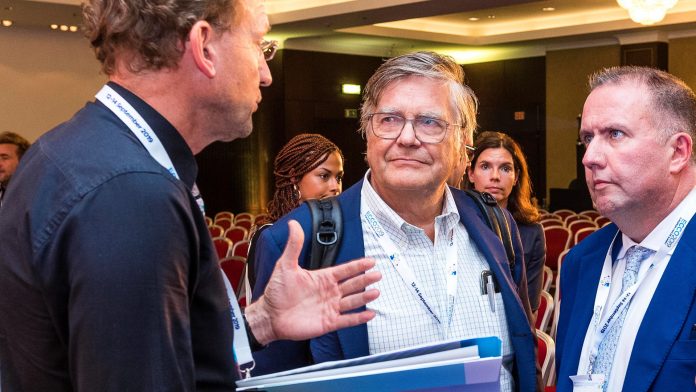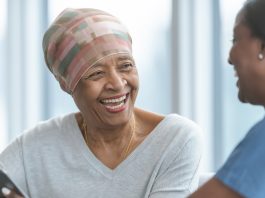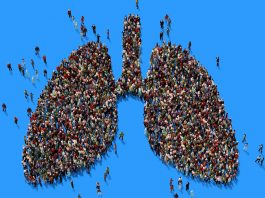The Innovation Platform speaks to European Cancer Organisation Chief Executive Mike Morrissey about how the upsurge of innovations in the field of cancer care.
Reaching the 70:35 Vision for cancer – 70% long term survival for all cancer patients across Europe by 2035 – requires breaking down the borders of cancer care: between countries, professions, sectors and stakeholders.
The European Cancer Organisation (ECCO) has a mission of improving outcomes and the quality of care for cancer patients, through multidisciplinarity and multi-professionalism. Through its network of 28 member organisations and 17 connected patient associations, ECCO does this by two main means: providing a united voice for the cancer community to policy makers and providing a forum for our members to connect and work together with other stakeholders on matters of common policy interest.
The Innovation Platform speaks to ECCO Chief Executive Mike Morrissey about how the upsurge of innovations in the field of cancer care, can only provide real opportunities for patients if we create the right environment for their universal and equitable adoption.
To begin, can you tell us about ECCO’s current policy priorities?
At ECCO, our current policy priorities include ensuring that the developing European Beating Cancer Plan and European Cancer Mission are as high impact as possible and bringing our members and others together on eight identified Focused Topics. For the Plan and Mission, we are urging that the European Union (EU) make these as ambitious as possible whilst remaining achievable. We call for big stretch targets such as achieving 70% average long-term survival for patients with cancer by 2035, doubling survival for poor prognosis tumours, and eliminating HPV caused cancers as a public health problem.
On the pressing and emerging topics that we want to assist members and the cancer community on, these include, but are not limited to: treatment optimisation (making better use of what we have with the resources available), improving the quality of cancer care that patients receive (including via the ECCO Essential Requirements for Quality Cancer Care – ERQCCs), leveraging digital health tools for outcome improvement, and driving action for HPV cancer elimination in Europe.
Can you tell us about Essential Requirements for Quality Cancer? Why is it important to have organisational specification papers such as these?
The ECCO Essential Requirements for Quality Cancer Care (ERQCCs) are unique multi-stakeholder consensus documents that articulate what the treatment journey should look like for each tumour type, including the professions that should be intimately involved in the care pathway, what those roles are, and other aspects that a patient should expect to receive, such as in relation to patient information, follow up and survivorship.
We developed this programme in order to further advance the achievement of multidisciplinarity care in Europe. We often use the phrase ‘multidisciplinarity’ but it is vital that we commit to papers that demonstrate everyday real life situations. Who needs to be involved in cases of gastric cancer? What is the particular role of the nutritionist in respect to colorectal cancer? These questions deserve not only answers but also the powerful impact that is achieved when all other professions, as well as patient organisations, are endorsing the role of another profession. That is the kind of unique facilitating activity that ECCO can conduct as an umbrella federation closely connected to the patient community.
Why are there barriers between primary and secondary care? What does this mean and how can this be fixed?
With rising cancer incidence, as well as increasing survivorship, cancer is no longer something that is only treated in hospitals. There are enormously important roles to be played by healthcare professionals and others working in the primary care sector. In terms of prevention, this includes the roles community pharmacists can play in smoking cessation and weight management, the role of GPs in early detection, multimorbidity management, psycho-oncologists in assisting patients and their loved ones with the trauma too often associated with cancer, and many other important interventions in the community sector.
ECCO’s Board have long realised the need to promote this agenda in order to achieve the best possible quality of care for cancer patients. For this reason, we embarked on a project to define the Essential Requirements for Quality Cancer Care: Primary Care. This paper makes clear to health system planners what high functioning primary care looks like in respect to improving cancer care, and also outlines some of the barriers that get in the way of community and secondary care working well together. This can include an array of bureaucratic barriers such as the transfer and accessibility of patient data, and cultural and system barriers (such as the lack of integration of health service payment and reimbursement models). Training and development needs for primary care professionals to keep up with the new world of cancer care in community (such as oral chemotherapy) must also be recognised.
Like so many problems, what is required to fix them is political will. That is why, at the ECCO 2018 European Cancer Summit, ECCO passed a resolution supported by the full cancer community in attendance: “By 2025, all national cancer plans in Europe should contain ambitious and measurable goals and actions to improve the integration of primary care healthcare professionals and informal carers within multidisciplinarity care to patients.” This matter will continue to be in our focus as we develop our new Focused Topic Networks on topics such as Treatment Optimisation, Quality Cancer Care, Prevention and Survivorship.
What are some of the latest innovations in cancer care?
In the last couple of years, we have seen an upsurge of exciting new findings and innovations in the field of cancer care that provide real opportunity for meaningful improvements for cancer patient outcomes and experience – but only if we create the right environment for their universal and equitable adoption. Over the last two to three decades, the field of cancer has seen improvements in the speed and accuracy of diagnostic procedures, the effectiveness of surgery, radiation therapy and medical treatments and the power of information technology. Development of clinical support roles such as those of specialist oncology nurses and of multidisciplinarity, specialist-led approaches to care have also played an important role in improving the care offered to cancer patients.
At the moment, are these innovations accessible to all cancer patients across Europe? If not, then how can it be achieved?
What we often hear is the problem that there can be something of a ‘wild west’ in respect to the uptake of innovations. Zooming out for a more holistic picture, concerns can be raised about why resources are allocated to one area of innovation over another. Therefore, for some time now, we have been working with members to see what we might be able to contribute to the discussion in respect to bringing a greater sense of order and coherence to this landscape. On the positive side, with Artificial Intelligence (AI) and other technological leaps forward associated with the ‘Fourth Industrial Revolution’ we can expect the pace of innovation to continue or accelerate. On the other hand, are health systems really ready for this? In most cases, probably not.
We have therefore published a consensus paper of our members on ‘Access to Innovation’ which sets out a number of recommendations for improvement, including greater involvement of patients and caregivers in defining what we really mean and understand by the ‘value’ of an innovation. Often this is about much more than life extension but includes many too often overlooked elements of quality of life, such as the chance to return to work, suffer less side effects, including in respect to under-discussed matters such as sexual life.
Our Focused Topic Network on Treatment Optimisation will therefore continue to work in this area, including consideration of how concepts of value can be applied consistently across all treatment modalities, and how best to combat inefficiencies in cancer care to realise more resource for upcoming meaningful innovations.
Where do you hope to see cancer care in Europe in five years’ time? What role do you hope to see ECCO play in this?
We hope that in five years’ time, the cancer community will be well on track to achieve the 70:35 Vision for cancer, which aims to have a 70 % average long-term survival for all cancer patients across Europe by 2035. In order to turn this into reality, we need to set bold and ambitious goals and give attention to other aims to get there, including doubling survival for patients with poor prognosis tumours, eliminating HPV-caused cancers as a public health concern, and halving deaths from childhood cancers.
Through our new four year strategy (2020-2023), we will convene not only our members, but also patient organisations, EU and WHO stakeholders, invited experts and institutions and our ‘Community 365’ of funding supporters to tackle big topics, create new areas of consensus and push all Governments to go further and faster in conquering cancer in Europe.
Mike Morrissey
Chief Executive
European CanCer Organisation
Tweet @EuropeanCancer
https://www.ecco-org.eu
Please note, this article will also appear in the first edition of our new quarterly publication.









